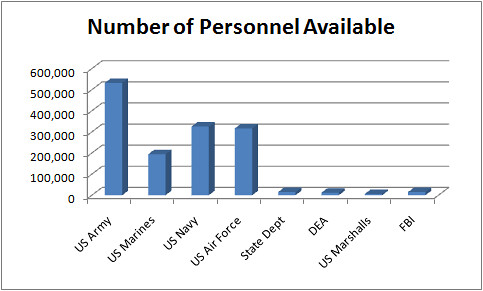This thread started with CavGuy posting a map that shows how DoD and State breakdown the world map into regions. So that is one big-picture question regarding the "whole of gov't" approach. I was also recently thinking about the activity down at the individual level. After googling for some statistics I made the following graph (I admit to not spending lots of time searching for the best data, but I think these are ballpark figures)...
The DoD numbers are from the FY2009 Defense Authorization Bill. Other sources - if anyone cares - are listed in my rambling blog entry. There seems to be a tremendous disparity in "troops available," which most likely causes all agencies to rely heavily on DoD and, as a result, tend to follow DoD's lead.
Here is the breakdown in Afghanistan (again, my data sources are not the greatest, but I think these are ballpark)...
If you add up State, DEA, and CIA, they are still outnumbered by more than 30 to 1 by DoD (none of the bars include contractors, of which, I think DoD has a whole lot more). I've seen "other" agencies get quickly marginalized on military staffs because the military staff wants to know "what do you bring to the table?" If the answer to that question is not what the military cmd/staff is looking for, then that person has a long, uneventful deployment and gets very little accomplished. The military staff drives ahead and the other agency individual is just along for the ride.
I'm not pointing the finger at DoD, so much as just observing that when one agency dominates the organization, then the other agencies are forced to fall in line and you get no real serious collaboration that differs from what a joint staff produces. You only get a few other agencies coming along for the ride. But they never take turns driving or even touch the GPS. They just sit in the back and stare out the window (and lounge around the pool in the green zone). Obviously, there will be individual exceptions here and there (I'm thinking, for example, of Pol-Mil FSO's comment on another thread - see his last sentence). But, for the most part, when DoD outnumbers everyone else combined by 30 to 1, you're going to get a DoD-run operation, not a "whole of government" approach.
To reiterate, I am not pointing the finger at DoD. On the contrary, I think the other agencies are doing themselves and the country a disservice by failing to field adequate personnel. Take State, for example. I signed up for the FSO exam months ago. I just took it yesterday. Depending on how I did (I'll find out in several weeks), I might get an interview at some point in the future. And then how long will I need to wait before clearing the next hurdle? And why is this time-consuming process so selective? I've seen Soldiers join the Army with a GED and criminal record who deploy to Iraq and are masterful at their jobs, interacting smartly with locals, gathering solid intel with only the assistance of a lackluster interpreter, and establishing a great rapport with entire neighborhoods. Maybe we're working too hard to recruit ideal candidates with fancy degrees and impressive resumes and not working hard enough at recruiting enough people who have enough potential to do a good enough job.








Bookmarks